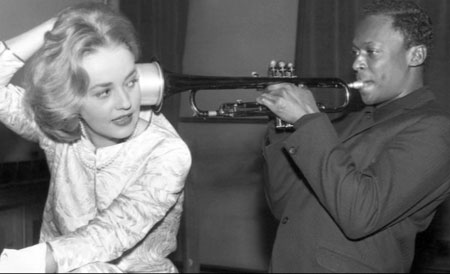In the first in a series of posts on music for film Ian Houston Shadwell traces the birth of Miles Davis‘s groundbreaking composition for Louis Malle’s classic “Ascenseur pour l’Echafaud”…
In 1957 Miles was at the beginning of his cool jazz phase, fresh from recording Miles Ahead, his first collaboration with Gil Evans and two years from the apogee of this period, Kind of Blue. He had left his band in America and had spent most of the year working with with a pick up ensemble of various French sidemen and American drummer Kenny Clarke .
It was during this period, whilst performing in Paris that he was approached by Louis Malle to compose the soundtrack for Malle’s first film Ascenseur pour l’Échafaud. After watching the film Miles agreed to the commission. But rather than compose anything in the traditional sense, he simply sketched out some chords and gave them to his band on the day of the session.
Miles insisted that the recording should be made in a darkened run down building, to match the mood of the film’s groundbreaking look. The session took place between ten in the evening till five the next morning with Jeanne Moureau staffing a bar set up for the musicians. The band performed in front of a projection of the film, improvising on the basic themes Miles had given them. They recorded each sequence as they watched. It was, in a very real sense a recording of the band’s immediate response to what they saw.
The resulting soundtrack is filled with an exotic, extraordinary tension that burnishes the air, as if it were crafted from the shadows and light of the celluloid. Listening to it in isolation from the film, it has an otherworldly ambience, a kind of space jazz, that launches itself from nowhere to hang images in the air. The performances feature a casual dynamic, like gusts of wind, that die away to nothing with barely a warning. Perhaps this is because the music is structured by the visual rather than the traditional dynamics of a band interacting. It is as if the film were a member of the ensemble. A silent partner that only the musicians could “hear”. This “visuality” provided a logic that privileges space above all other things, creating an “urban sublime”, in which we can hear the empty streets of the city at night as both a thing of beauty as well as menace.
Tonally, the work eschews the more sophisticated harmonic structures of his earlier compositions, and instead, seeks virtuosity in phrasing and tone. Rather than exploring the modality of quickly changing chords with hurried runs, each phrase is delivered fully formed over a backing that generally maintains the same mode. This approach, of space and pure phrasing, will go on to structure Miles’ work for the next five years, culminating in the diamond hard logic of Kind of Blue.
In combination with the film, it takes on an entirely different life. Jeanne Moureau’s presence on the screen seems to conjure the music from the very air of the Parisian night, as she loses herself in the careless abandon of desire. Her beauty a poignant counterpoint to the smudged, blurred yearning of the trumpet’s timbre. There is an uneasy intensity in the counterpoint of film and music, with these unmodulated improvisations denying the viewer the regular patterns and motifs of a composed soundtrack. This relationship between film and improvisation, is fascinating, given the way Miles own reactions map ours, seemingly accentuating the intangible, the abstract desire of his phrasing, a perfect echo of the yearning in Moreu’s extraordinary performance. It is a remarkable mesh of sound and image, that lifted the picture into another realm.
At the time, it was greeted as a glimpse into the future, the first film of the New Wave, with Mile’s austere soundtrack, lacking theme or orchestration, being considered a provocative, dissonant emphasis of an urban alienation. Today, mellowed by age, the film seems timeless, absorbed with the dark beauty of a city, its inhabitants and this music. It presaged a new approach to the soundtrack that saw the ambience of contemporary music replace the reworking of classical tropes, and it gave Miles the inspiration to create a whole new genre of performance that would inform his work for the next decade.


Pingback: Tweets that mention Miles Davis was in Paris | -- Topsy.com
Great to see artlife dipping into some music. You should do something on Scott Walker’s soundtrack for Leo Carax’s Pola X.
nice post. thanks.